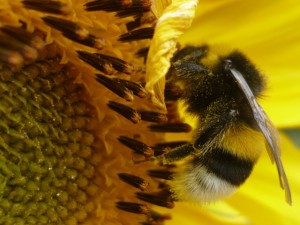The Fable of the Bees, written by Bernard Mandeville in 1705, is a poem which observed how each bee serving its own interest contributed to the common good. Adam Smith took up Mandeville’s themes, which are the bedrock of capitalist philosophy to this day, but it does not frame systemic, collective problems in a way that can be easily addressed.
Today, the plight of the bees emphasizes a different fable. In the United States in 2009- 2010, about a third of all honeybee hives disappeared (Colony Collapse Disorder, or CCD), depending on how one interprets the survey of beekeepers. For 30 years or more, in all industrial societies the general health of bees has been has declining. Many farmers can no longer depend on bees in the wild for pollination. Commercial beekeepers truck bees to the farms (adds a dab to GNP). The price of a hive is rising. Theft of hives has been reported in Britain, and it’s serious in Japan, where a hive is $400.
In several years investigating CCD, no single cause has been identified, making it more and more unlikely that a “magic bullet” will make it go away. Scientific consensus has not solidified, and CCD is only one health hazard to bees, beginning with Varroa mites. Beehives are contaminated with a variety of industrial residues. And more than one biologist has suggested that everyone plant a greater variety of plant life. Honeybees feasting on a variety of nectar seem to have greater immunity than if they only have a monocrop to dine on. All bee problems, not just CCD, seem associated with the inability of bee immunity systems to adapt to the stresses placed on them.
Bee health is a wicked problem because it seems to connect with everything else. Germany, Italy, France, and England have banned various Bayer herbicides. Bayer insists that since evidence does not pinpoint them, they are not responsible. Apiarists, farmers, and gardeners are pushing back mightily, especially in Europe.
Mandeville’s fable frames an entrepreneurial instinct, independently looking for something to make, invent, or market. If there isn’t one, and we all have to change what we do, even if it hurts, this market logic at best says to “collaborate closely with customers” – do market research seeking to increase sales. Alternatives that might decrease any entity’s sales are excluded from “solution possibilities,” so it’s an expansionary way to frame problems.
Mandeville’s observations were incomplete. Today, a bee fable more likely suggests swarm technology: A swarm of independent agents all with a similar goal, producing superior solutions to reach that goal. A Google search will turn up a variety of contexts for this logic, usually expressed in software, but in human organizations it implies fast-learning collective intelligence, not totally independent entrepreneurs racing for a market bonanza. Bees and ants follow their scouts’ trails to food jackpots. To manage the habitability of their own environment, not just exploit it, humans must be more intelligent devising more complex systems objectives. (This is not impossible; smart farmers caring for the soil have done something like it for millennia.)
But to do this now, humans must learn to deal with wicked problems (clashing “interests”) in addition to using scientific logic to eliminate waste and create failsafe processes. That’s an exercise in collective logic with everyone’s long-term interest at stake.

